When it comes to tying the knot, couples have a variety of options to choose from. One of the biggest decisions they’ll have to make is whether to elope or have a traditional wedding. While both options have their pros and cons, ultimately the choice will come down to what the couple values most.
Eloping has become increasingly popular in recent years, with many couples opting for a more intimate and private ceremony. This can be a great option for couples who want to avoid the stress and expense of planning a big wedding. Elopements can also be a way for couples to focus on their love and commitment to each other without the distractions of a big event. However, eloping may not be the best choice for couples who want to involve their family and friends in their special day.
Understanding Elopements

What Is an Elopement?
An elopement is a private and intimate wedding ceremony that typically involves only the couple, an officiant, and a witness. Elopements are often associated with running away to get married in secret, but that is not always the case. Today, elopements can be planned in advance and can take place in a variety of locations, from a courthouse to a mountaintop.
Reasons Couples Choose to Elope
There are many reasons why couples choose to elope. Some couples prefer the intimacy and privacy of an elopement over a traditional wedding. Others may want to save money or avoid the stress and pressure of planning a large wedding. Adventure elopements have also become increasingly popular, as couples opt for a unique and memorable experience in a beautiful location.
Elopement Ceremony Essentials
While elopements are typically more casual and intimate than traditional weddings, there are still some essential elements to consider. The couple will need to obtain a marriage license and find an officiant to perform the ceremony. They may also want to hire a photographer or videographer to capture the elopement experience. Other details to consider include the location, attire, and any special touches that will make the elopement day memorable.
Overall, elopements offer couples a unique and intimate way to celebrate their love. Whether it’s a simple courthouse ceremony or an adventurous mountaintop elopement, the focus is on the couple and their commitment to each other.
Traditional Weddings Demystified
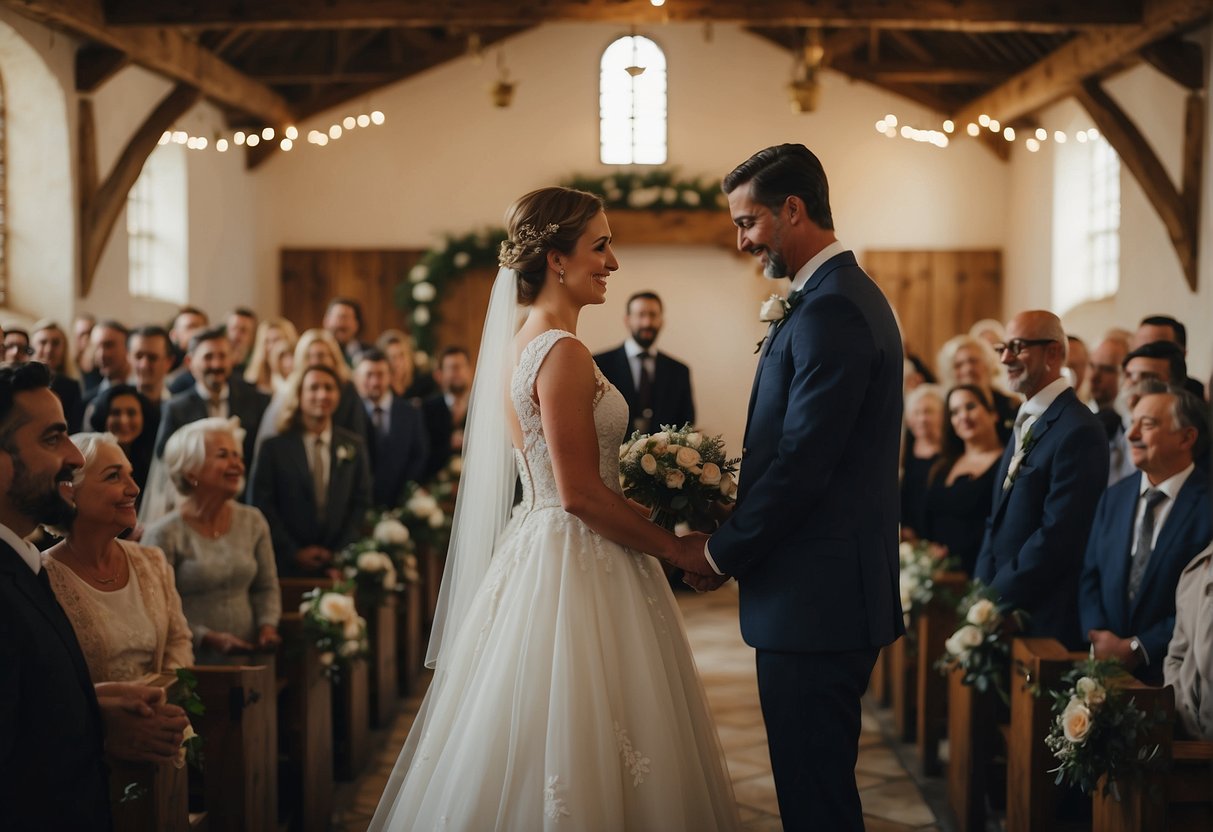
Components of a Traditional Wedding
A traditional wedding ceremony typically includes several key components. The first is the processional, during which the wedding party walks down the aisle to the altar. This is followed by the exchange of vows, the exchange of rings, and the pronouncement of the couple as married. The ceremony may also include readings, music, and other symbolic gestures, such as the lighting of a unity candle or the tying of a knot.
After the ceremony, guests typically move to the reception venue for a meal, dancing, and other festivities. The reception may include speeches, toasts, and other traditions, such as the cutting of the cake or the throwing of the bouquet.
The Significance of Wedding Traditions
Wedding traditions have been passed down through generations and hold significant meaning for many couples. For example, the white wedding dress is a symbol of purity and innocence, while the exchange of rings represents the eternal bond between the couple. The bouquet toss is said to bring good luck to the recipient, while the first dance is a celebration of the newlyweds’ love and commitment.
While some couples choose to incorporate non-traditional elements into their wedding day, many still find comfort and meaning in these time-honored traditions. Wedding planning can be a daunting task, but understanding the significance of these traditions can help couples create a meaningful and memorable wedding day.
In conclusion, traditional weddings have a rich history and hold significant meaning for many couples. By understanding the components of a traditional wedding and the significance of wedding traditions, couples can plan a wedding that reflects their values and celebrates their love and commitment.
Comparing Costs
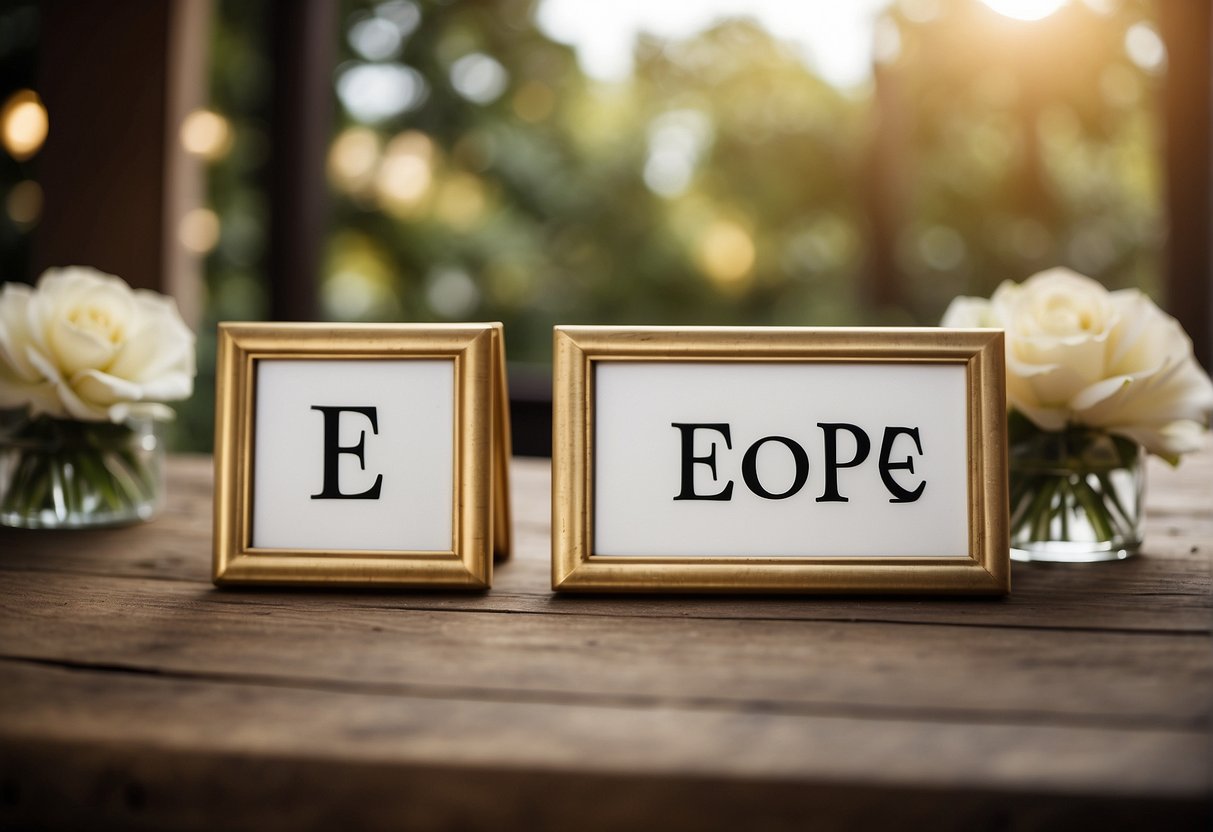
Elopement Expenses
Eloping can be a cost-effective alternative to a traditional wedding. The average cost of an elopement ranges from $500 to $5,000, depending on the location, the number of guests, and the services included. The expenses for an elopement typically include the following:
- Marriage license fees
- Officiant fees
- Photography
- Transportation
- Accommodations
- Attire
- Flowers
- Rings
Couples who elope can save money on catering, venue rental, and entertainment, which are some of the most significant expenses associated with a traditional wedding.
Wedding Budget Breakdown
On the other hand, planning a wedding can be a costly endeavor. The average cost of a wedding in the United States is $33,900, according to The Knot’s 2021 Real Weddings Study. The expenses for a wedding typically include the following:
- Venue rental
- Catering
- Photography and videography
- Entertainment
- Attire
- Flowers and decorations
- Invitations and stationery
- Transportation
- Favors and gifts
Couples who opt for a traditional wedding may need to allocate a significant portion of their budget to the venue rental and catering, which can account for up to 50% of the total cost. Additionally, the cost of a wedding can vary significantly depending on the location, the number of guests, and the level of customization.
In conclusion, while eloping can be a more affordable option for couples, a traditional wedding can provide a more elaborate and memorable experience. Ultimately, the decision to elope or plan a wedding should be based on the couple’s preferences and budget.
Planning and Organization

Elopement Planning Considerations
Eloping can be a great option for couples who want to avoid the stress and expense of a traditional wedding. However, it still requires some planning and organization to ensure that everything goes smoothly on the big day. One of the most important considerations when planning an elopement is the location. Couples should choose a place that is meaningful to them, whether it’s a favorite park, a scenic overlook, or a destination they’ve always wanted to visit.
Another important consideration is the legal requirements for getting married in the chosen location. Some places require a waiting period or specific documentation, so couples should research the requirements well in advance and make sure they have everything they need. They may also want to consider hiring a wedding planner or elopement coordinator to help with the logistics and ensure that everything runs smoothly.
Wedding Planning Process
Planning a traditional wedding can be a complex and time-consuming process, but it can also be a lot of fun. The first step is to set a budget and create a guest list. Once those details are in place, couples can start looking for a venue, choosing a theme or color scheme, and selecting vendors such as caterers, florists, and photographers.
Wedding planners can be a valuable resource for couples who want to simplify the planning process and ensure that everything goes smoothly on the big day. A good wedding planner can help with everything from choosing a venue to managing the guest list to coordinating with vendors. They can also provide guidance and advice on everything from wedding etiquette to choosing the perfect dress.
Regardless of whether a couple chooses to elope or have a traditional wedding, planning and organization are essential for a successful and stress-free experience. Taking the time to research options, set a budget, and hire professionals when needed can help ensure that the big day is everything the couple hopes for and more.
Guests and Guest Lists
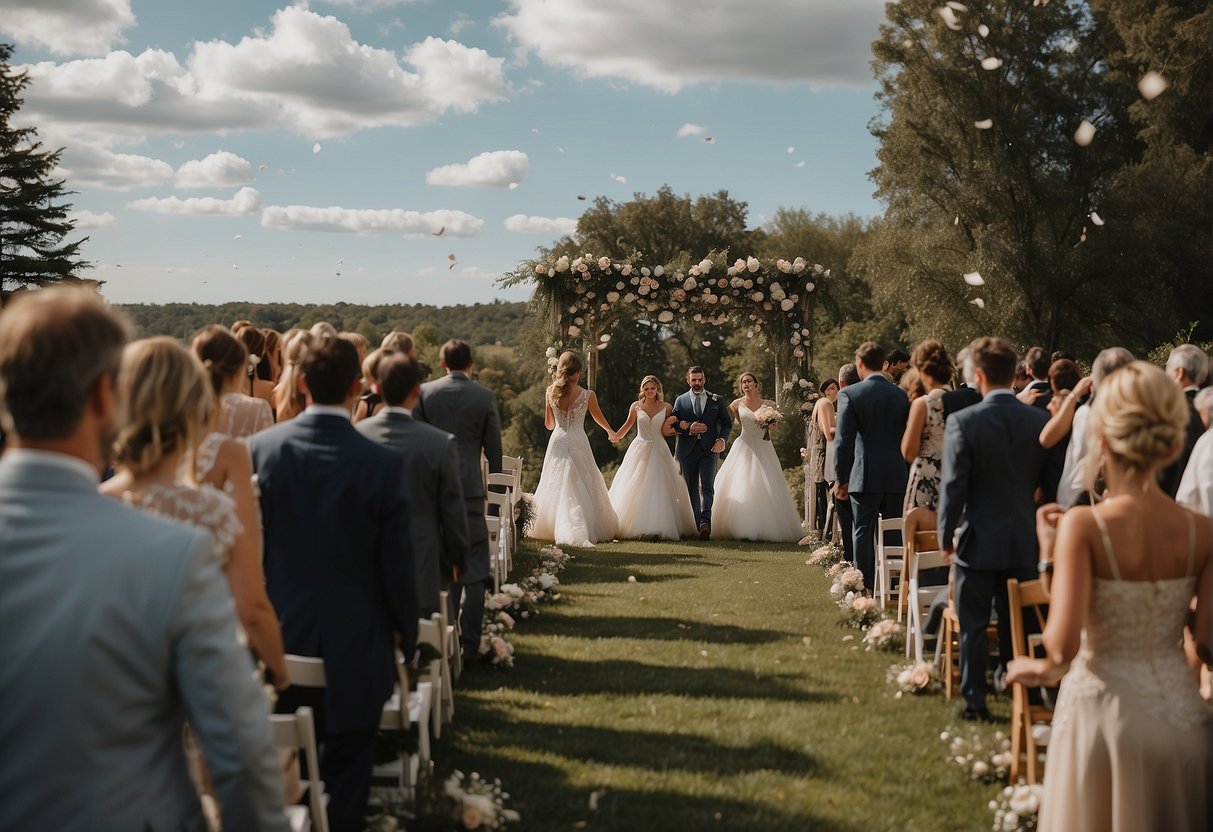
Deciding Your Guest Count
One of the most important decisions when planning a wedding or elopement is deciding how many guests to invite. For those who opt for a traditional wedding, the guest count can easily reach into the hundreds, while elopements are typically more intimate affairs with a smaller guest list.
When deciding on the guest count, it is important to consider the size of the venue, the budget, and the couple’s personal preferences. A smaller guest count can often lead to a more intimate and romantic atmosphere, while a larger guest count can create a more lively and festive environment.
Managing Family-Related Stress
One of the biggest sources of stress when it comes to guest lists is managing family expectations. It can be difficult to balance the desires of the couple with the desires of their families, particularly when it comes to inviting extended family members or family friends.
To mitigate this stress, it is important to have open and honest communication with family members about the guest list. The couple should make it clear that they are making decisions based on their own preferences and budget, and that not everyone will be able to be invited.
It can also be helpful to set clear boundaries and expectations with family members early on in the planning process. This can include having a set guest count limit or only inviting immediate family members.
Overall, whether choosing to elope or have a traditional wedding, managing the guest list can be a challenging but important aspect of the planning process. By considering the size of the venue, budget, and personal preferences, as well as having open communication with family members, couples can create a guest list that is both manageable and meaningful.
Choosing the Perfect Location

When it comes to planning a wedding or elopement, choosing the perfect location is one of the most important decisions you’ll make. The location sets the tone for the entire event, and can make or break the experience for you and your guests. Here are some things to consider when choosing between elopement venues and wedding venues.
Elopement Venues
Elopements are all about intimacy and adventure. If you’re looking for a secluded, romantic location for your elopement, consider a national park or other outdoor destination. Many national parks offer elopement packages that include everything from permits to photography, making it easy to plan your special day.
If you’re looking for a more unique elopement experience, consider an adventure wedding. Adventure weddings can take place anywhere from a mountaintop to a desert canyon, and can include activities like hiking, rock climbing, or even skydiving. Just be sure to choose a location that’s safe and legal for your chosen activity.
Wedding Venues
Weddings are typically larger and more formal affairs than elopements, and require a different type of venue. When choosing a wedding venue, consider the size of your guest list, the style of your wedding, and your budget. Some popular wedding venues include:
- Hotels and resorts
- Country clubs
- Vineyards and wineries
- Historic mansions and homes
Many wedding venues offer packages that include catering, decorations, and other services, making it easy to plan your big day. Just be sure to book your venue well in advance, as popular locations can fill up quickly.
Ultimately, whether you choose an elopement or a wedding, the location you choose should reflect your personal style and preferences. With a little research and planning, you can find the perfect venue for your special day.
Personalization and Intimacy
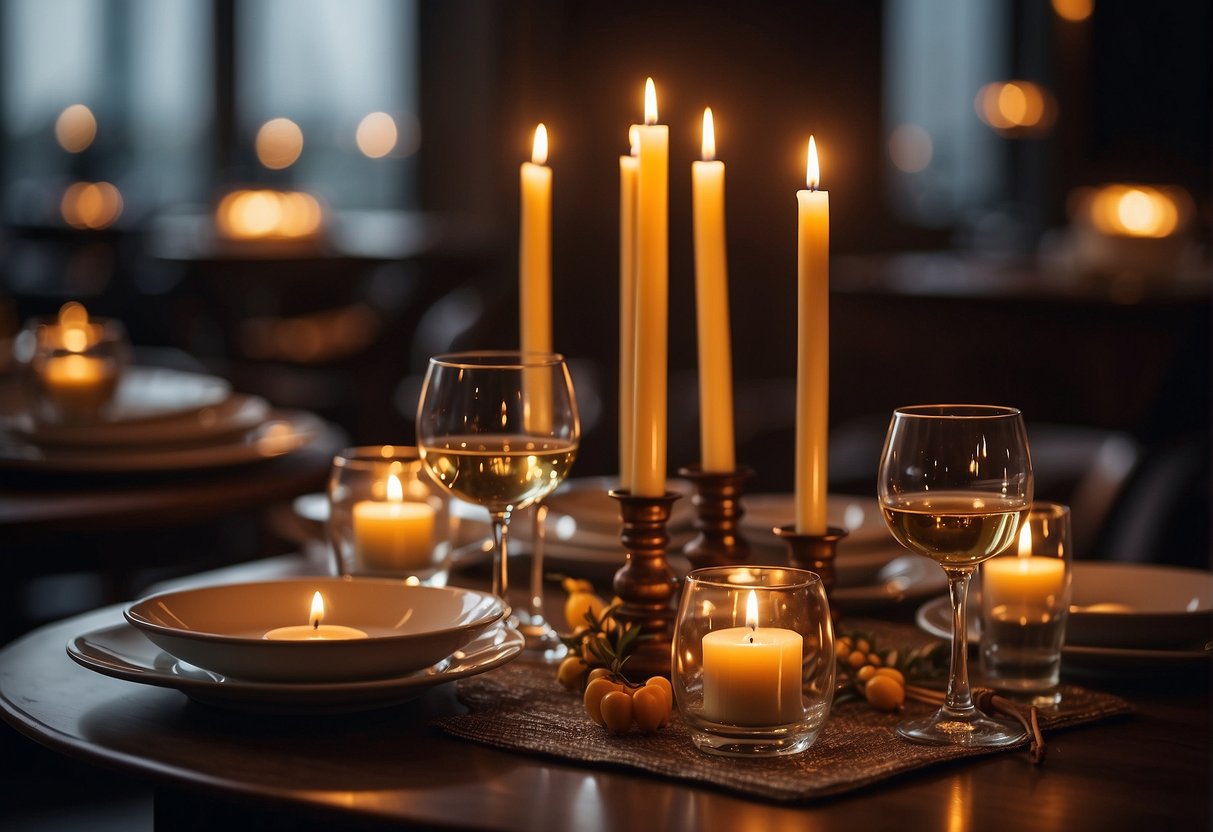
When it comes to eloping vs. having a wedding, one of the biggest differences is the level of personalization and intimacy. While weddings can be grand and elaborate, elopements tend to focus on the couple and their connection.
Crafting an Intimate Ceremony
Intimate ceremonies are a hallmark of elopements. With only a few close friends or family members present, the focus is on the couple and their commitment to each other. This can create a sense of closeness and intimacy that may be harder to achieve in a larger wedding setting.
Couples who choose to elope can also customize their ceremony to fit their personalities and preferences. Whether they opt for a simple exchange of vows or a more elaborate ritual, they have the freedom to create a ceremony that truly reflects who they are as a couple.
Adding Personal Touches
Personalization is another key benefit of eloping. With fewer guests to worry about, couples can focus on adding special touches that make their day truly unique. This might include writing their own vows, choosing a special location, or incorporating meaningful symbols or traditions into the ceremony.
Privacy is also a factor in elopements. With no audience beyond their closest loved ones, couples can feel free to express their love in ways that might not be possible in a more public setting. Private vows, for example, can create a sense of intimacy that is hard to replicate in a larger wedding.
Overall, eloping offers couples the opportunity to create a deeply personal and intimate experience that is all about them and their love for each other. Whether they choose to keep things simple or add special touches, an elopement can be a meaningful and memorable way to celebrate their commitment.
Legalities and Officiants
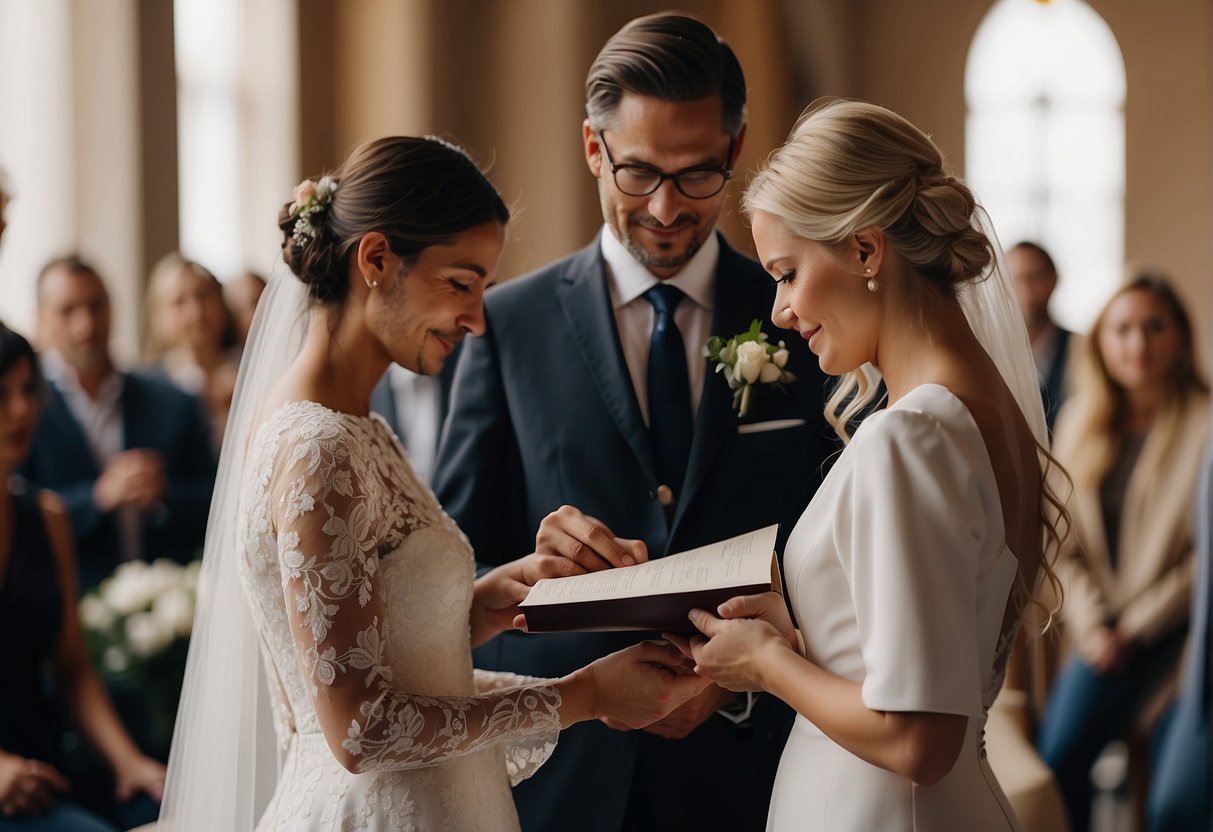
Marriage License Requirements
Before tying the knot, couples must obtain a marriage license from the state they plan to get married in. The requirements for obtaining a marriage license vary by state, but typically include providing identification, proof of age, and sometimes proof of residency. Some states may also require a blood test or a waiting period before the license is issued.
It is important to research the specific requirements for the state where the couple plans to get married and ensure they have all necessary documentation before applying for a marriage license.
Choosing an Officiant
An officiant is the person who performs the wedding ceremony and legally binds the couple in marriage. In some states, couples may choose to have a friend or family member perform the ceremony, while other states require the officiant to be a licensed clergy member or judge.
When choosing an officiant, couples should consider their personal preferences, as well as any legal requirements in their state. They may also want to discuss the ceremony details with the officiant to ensure they are comfortable with the chosen style and content.
It is important to note that some states may have additional requirements for officiants, such as registration or certification. Couples should research the specific requirements in their state and ensure their chosen officiant meets all necessary criteria.
Overall, couples should carefully consider the legalities and requirements involved in obtaining a marriage license and choosing an officiant to ensure their wedding day is both meaningful and legally binding.
Post-Elopement Celebrations
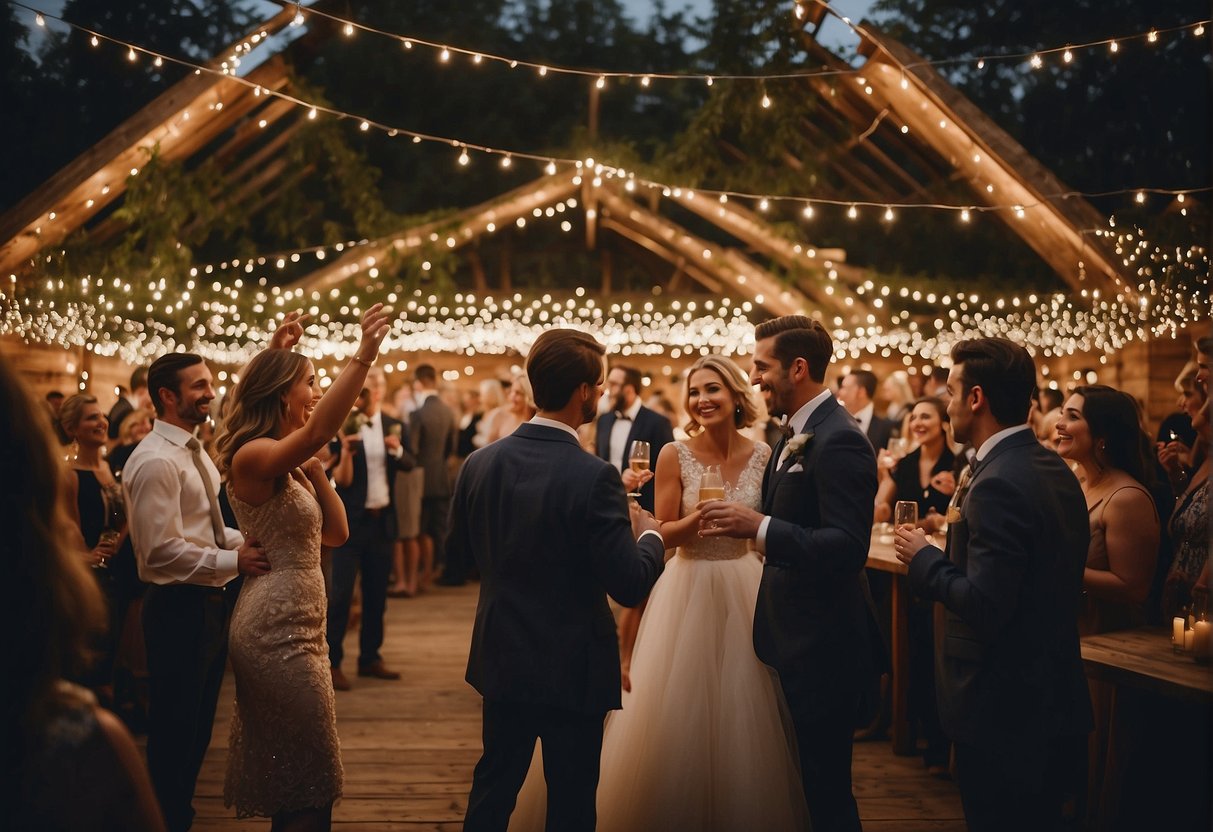
After eloping, couples may choose to have a post-elopement celebration to share their joy with loved ones who were not present at the ceremony. Here are some things to consider when planning a post-elopement reception.
Planning a Post-Elopement Reception
When planning a post-elopement reception, couples should consider their budget, guest list, and venue. They may choose to have a big party or a small gathering with close friends and family. Some couples opt for a formal sit-down dinner, while others prefer a more casual affair.
To save money, couples can consider hosting the reception at a friend or family member’s home or a public park. They can also choose to have a potluck-style meal or hire a food truck for a fun and unique dining experience.
Decorations can be simple or elaborate, depending on the couple’s preferences and budget. DIY decorations can also add a personal touch to the celebration.
Sharing Your Elopement with Loved Ones
When sharing the news of their elopement with loved ones, couples may choose to send out formal announcements or post photos and updates on social media. They can also choose to include a special message or thank-you note to those who have supported them throughout their relationship.
During the post-elopement celebration, couples may choose to display photos or videos of their elopement ceremony for guests to enjoy. They can also include special touches, such as a slideshow of their relationship milestones or a photo booth for guests to take fun pictures.
Overall, a post-elopement celebration can be a wonderful way to share the joy of a couple’s union with loved ones. With careful planning and consideration, couples can create a memorable and meaningful event that reflects their personalities and relationship.
Pros and Cons of Eloping
Advantages of an Intimate Elopement
Eloping has become an increasingly popular option for couples who want to avoid the stress and expense of planning a traditional wedding. One of the main advantages of eloping is the ability to have a more intimate ceremony with just the couple and a few close family members or friends. This can make the experience more meaningful and allow for a greater focus on the couple’s love for each other rather than the production of a big wedding.
Another advantage of eloping is the opportunity for adventure. Couples can choose to elope in a unique location, such as a mountaintop or a secluded beach, and make the experience truly unforgettable. This can also be a great way to save money on a honeymoon, as the elopement itself can serve as a romantic getaway.
Considerations and Compromises
While eloping can be a great option for some couples, there are also some potential drawbacks to consider. One of the main cons of eloping is that it may not be well-received by family and friends who were expecting a traditional wedding. This can cause tension and hurt feelings, and couples should be prepared to have difficult conversations with loved ones about their decision to elope.
Another consideration is that eloping may require compromises in terms of the couple’s vision for their wedding day. For example, they may need to forgo certain traditions or elements that they would have included in a traditional wedding. Additionally, eloping may not be the best option for couples who are looking to settle down and start a family right away, as it may be important to have a larger celebration with family and friends to mark this milestone.
Overall, eloping can be a wonderful way for couples to celebrate their love in a more intimate and adventurous way. However, it’s important to carefully consider the pros and cons before making a decision and be prepared to have difficult conversations with loved ones about their choice.
Final Thoughts
In the end, the decision to elope or have a wedding ultimately comes down to personal preference. Both options have their own unique advantages and disadvantages.
For those who value intimacy and privacy, eloping may be the ideal choice. It allows the couple to focus solely on their love and commitment to each other without the distractions and stress that can come with planning a large wedding. Additionally, eloping can be a more affordable option, as it eliminates the need for expensive venue rentals, catering, and other wedding-related expenses.
On the other hand, weddings offer a chance for couples to celebrate their love with family and friends. It can be a wonderful opportunity to create lasting memories with loved ones and exchange vows in a beautiful setting. Weddings also provide a chance for couples to express their unique personalities and style through decorations, attire, and other details.
Regardless of which option a couple chooses, the most important thing is that they are committing to a lifetime of love and partnership. Whether they exchange vows in front of a large crowd or in a private ceremony, the bond they share is what truly matters.
In the end, the decision between eloping or having a wedding should be based on what feels right for the couple and their relationship. As long as they are committed to each other and their love, the details of the ceremony are secondary.
